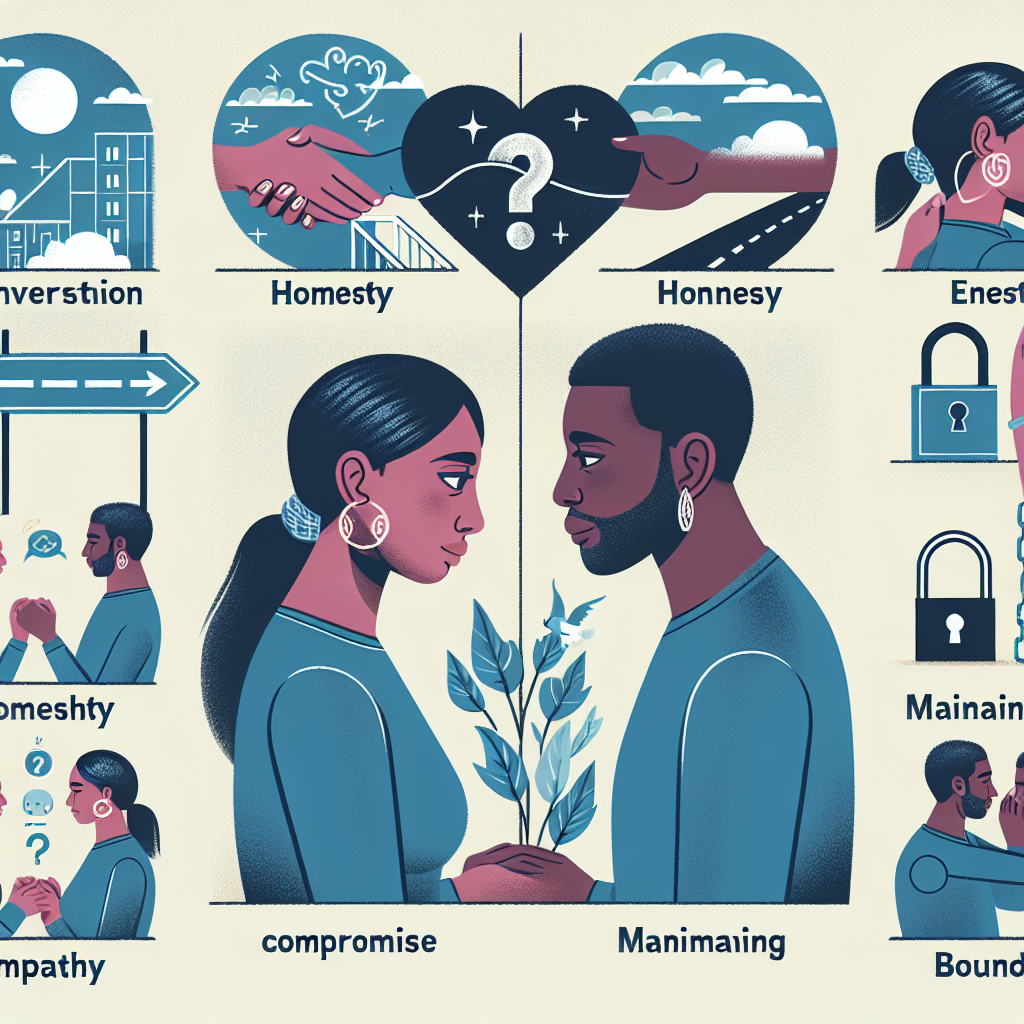How to get trust back in a relatationship after cheating is crucial for its success and longevity.
Trust forms the foundation upon which all other aspects of a relationship are built.
whether it's a romantic relationship, friendship, or familial bond, trust is essential. Without it, misunderstandings, insecurities, and conflicts can arise. But how to get trust back in a relationship after cheating? This article will provide practical steps and insights on how to improve trust in a relationship.
Before delving into the steps to build trust, it's important to understand what trust means. Trust is the belief that someone is reliable, honest, and will do what they say they will. It's about having confidence in someone else's integrity and intentions. In relationships, trust means feeling safe and secure with another person, knowing that they have your best interests at heart.
Trust is often perceived as an abstract concept, but it is deeply rooted in tangible actions and interactions. It encompasses a sense of predictability and reliability, where each party can anticipate the other's behavior based on past experiences. Trust is not static; it evolves and adapts with the relationship, requiring continuous nurturing to remain robust.
Trust manifests differently across various types of relationships. In romantic relationships, it might involve fidelity and emotional openness. In friendships, it can mean being there in times of need and sharing personal thoughts. Familial trust often revolves around unconditional support and understanding. Recognizing these nuances helps tailor your approach to building trust in each unique relationship.
Trust is deeply embedded in psychological principles. It involves cognitive processes where individuals assess the risk of betrayal against the benefits of intimacy and connection. This assessment is influenced by past experiences, societal norms, and individual personality traits. Understanding this psychological backdrop can help you navigate trust-building more effectively, recognizing that some people may require more time or different approaches to develop trust.

One of the key ways to build trust is through open and honest communication. This means being transparent about your thoughts, feelings, and intentions. It's important to share your expectations and needs with your partner or friend. When communication is clear, it reduces misunderstandings and builds a stronger connection.
Part of open communication involves sharing your vulnerabilities. This doesn't mean exposing every flaw, but rather being honest about your fears, concerns, and insecurities. By doing so, you invite the other person to do the same, fostering a deeper connection built on mutual understanding. Vulnerability, when reciprocated, can significantly enhance trust.
Misunderstandings are inevitable in any relationship, but how they are handled can either build or erode trust. When a misunderstanding occurs, addressing it promptly and calmly is crucial. Clarifying intentions and seeking to understand the other person's perspective can prevent small issues from becoming larger conflicts, thus maintaining and even strengthening trust.
Every relationship benefits from having established norms around communication. This might include deciding on regular check-ins or agreeing on how to handle conflicts. By setting these norms, both parties know what to expect, reducing anxiety and promoting a stable environment where trust can flourish.
Communication isn't just about talking; it's also about listening. Active listening involves paying full attention to the speaker, understanding their message, and responding thoughtfully. By listening actively, you show that you value the other person's perspective, which helps in building trust.
To master active listening, employ techniques like paraphrasing and summarizing what the other person has said. This demonstrates that you are engaged and understand their message. Additionally, maintaining eye contact, nodding, and minimizing distractions can enhance the listening experience, making the speaker feel heard and valued.
Non-verbal cues play a significant role in communication. Facial expressions, body language, and tone of voice all contribute to how messages are received. Being aware of your non-verbal signals can prevent miscommunications and ensure that your words align with your actions, reinforcing trust.
Listening actively is not just about hearing words but also about understanding the emotions behind them. Responding with empathy involves acknowledging the speaker's feelings and validating their experiences. This empathetic response can reassure the other person that you are genuinely invested in their well-being, thereby building trust.

Reliability is a cornerstone of trust. To build trust in a relationship, it's important to be dependable. This means following through on your promises and commitments. Whether it's a small promise like calling at a certain time or a larger commitment like supporting someone during a tough time, being consistent in your actions builds trust.
Keeping promises, no matter how small, is a powerful way to build trust. Each kept promise serves as a building block in the relationship, reinforcing the belief that you are reliable. Conversely, breaking promises, especially repeatedly, can severely damage trust, making it imperative to only commit to what you can realistically deliver.
Trust isn't built overnight. It requires consistency over time. By consistently being there for someone and acting in a trustworthy manner, you gradually build a solid foundation of trust. This also means being predictable in your behavior, which provides a sense of security to the other person.
Establishing predictable patterns in behavior and communication helps create a sense of stability in the relationship. This doesn't mean being rigid or inflexible, but rather having a baseline of consistency that others can rely on. Such predictability fosters a safe environment where trust can thrive.
Small, consistent acts of reliability can have a profound impact on trust. Simple gestures like remembering important dates, being punctual, or checking in regularly show that you are attentive and care about the relationship. Over time, these small acts accumulate, solidifying trust and reinforcing your commitment.
Consistency is particularly crucial during challenging times. How you respond in moments of crisis can significantly influence the level of trust in a relationship. Being a steady presence and providing unwavering support when it's most needed can strengthen trust and deepen the bond between individuals.
Empathy involves understanding and being sensitive to another person's feelings and experiences. When you show empathy, you acknowledge the other person's emotions and demonstrate that you care. This helps in building trust as the other person feels understood and valued.
Recognizing emotional cues requires paying attention to both verbal and non-verbal signals. Words can convey emotions, but so can tone, facial expressions, and body language. By being attuned to these cues, you can better understand the other person's emotional state and respond appropriately, fostering a trusting environment.
Emotional intelligence plays a crucial role in empathy. It involves being aware of your own emotions, managing them effectively, and understanding the emotions of others. Developing emotional intelligence can enhance your ability to empathize, making it easier to build and maintain trust in relationships.
Empathy is most effective when it is reciprocal. While it's important to empathize with others, it's equally important for them to understand your emotions. Encouraging open dialogue about feelings can create a balanced dynamic where both parties feel valued and respected, strengthening trust.
It's not enough to just understand someone's feelings; you must also respond with compassion. This means offering support, comfort, and encouragement. By doing so, you reinforce the trust between you and show that you are a reliable partner or friend.
When responding with compassion, offering supportive feedback is key. Instead of criticizing or dismissing the other person's feelings, provide constructive feedback that acknowledges their emotions and offers guidance if needed. This approach can help build trust and promote a positive, collaborative relationship.
Patience is a crucial component of compassionate responses. Not every emotional situation can be resolved immediately, and sometimes simply being patient and offering a listening ear is the most compassionate response. Demonstrating patience can reinforce trust, showing the other person that you are willing to support them through their emotional journey.
Compassionate responses should also encourage positive growth. This involves helping the other person see potential solutions to their problems or guiding them towards personal development. By supporting their growth, you demonstrate a vested interest in their well-being, strengthening the trust between you.
No one is perfect, and mistakes are inevitable in any relationship. However, how you handle these mistakes is crucial for building trust. Admitting when you're wrong and taking responsibility for your actions shows integrity and honesty. It demonstrates that you are willing to own up to your mistakes and learn from them, which fosters trust.
Apologizing requires courage, as it involves admitting fault and vulnerability. A sincere apology acknowledges the impact of your actions on the other person and expresses genuine regret. By taking this step, you demonstrate accountability and a commitment to repairing the relationship, which can strengthen trust.
When confronted with a mistake, it's natural to become defensive. However, defensiveness can hinder the process of accountability and damage trust further. Instead, strive to remain open and receptive to feedback, focusing on understanding the other person's perspective and addressing their concerns.
Mistakes can be valuable learning opportunities. Reflecting on what went wrong and identifying ways to prevent similar issues in the future shows a commitment to growth and improvement. By demonstrating a willingness to learn from your mistakes, you reinforce trust by showing that you are dedicated to becoming a better partner or friend.
When you make a mistake, it's important to make amends. This might involve apologizing, offering a solution, or taking steps to prevent the mistake from happening again. By taking these actions, you show that you are committed to maintaining trust and improving the relationship.
Words alone are not enough to make amends; actions are crucial. Taking tangible steps to rectify the situation shows sincerity and a genuine desire to rebuild trust. Whether it's changing a behavior, fulfilling a promise, or making restitution, these actions demonstrate your dedication to repairing the relationship.
Forgiveness is an essential part of the process of making amends. While it may take time, offering and seeking forgiveness allows both parties to move forward and rebuild trust. Encouraging an open dialogue about forgiveness can facilitate healing and strengthen the relationship.
After resolving a conflict, reinforcing trust is vital. This involves consistently demonstrating trustworthy behavior and maintaining open communication to prevent future misunderstandings. By actively working to rebuild trust, you can restore the relationship to a healthier, more resilient state.
Every individual has their own set of boundaries, and respecting these is vital for building trust. Boundaries can be physical, emotional, or mental, and recognizing them shows respect for the other person's autonomy and individuality.
Before you can respect others' boundaries, it's important to identify your own. This involves understanding your limits and what makes you feel comfortable or uncomfortable in a relationship. By recognizing and communicating your boundaries, you set the stage for mutual respect and trust.
Violating boundaries can have serious consequences for trust. It can lead to feelings of betrayal, resentment, and insecurity. Understanding the impact of boundary violations underscores the importance of respecting and upholding them, as doing so is fundamental to maintaining a trusting relationship.
Respecting boundaries is a two-way street. Encourage open discussions about boundaries and emphasize the importance of mutual respect. By fostering an environment where both parties feel comfortable expressing their limits, you create a safe space that nurtures trust and strengthens the relationship.
It's important to have open discussions about boundaries in a relationship. This includes sharing your own boundaries and asking about the other person's. By understanding and respecting each other's limits, you create a safe environment that nurtures trust.
Clear communication about boundaries involves setting explicit expectations. This means discussing what behaviors are acceptable and what are not. By establishing these guidelines, both parties know where they stand, reducing the likelihood of misunderstandings and fostering trust.
Boundaries can change over time as relationships evolve. It's important to regularly revisit and renegotiate boundaries to ensure they still align with each person's needs and comfort levels. By being flexible and open to change, you demonstrate respect for the other person's growth and adaptability, reinforcing trust.
Disagreements about boundaries can arise, but how they are handled is crucial. Approach these discussions with empathy and an open mind, seeking to understand the other person's perspective. By collaboratively finding solutions, you can navigate boundary disagreements without compromising trust.
Being supportive is a key element of trust. This means being there for someone during challenging times and offering help when needed. By providing support, you demonstrate that you are a reliable partner who cares about the other person's well-being.
Offering support starts with being present and available. This means making time for the other person and actively listening to their needs and concerns. By showing that you are there for them, you reinforce the trust that they can rely on you during difficult times.
Each person has unique needs when it comes to support. Some may prefer practical help, while others might need emotional reassurance. Understanding and adapting to these preferences ensures that your support is meaningful and effective, strengthening trust in the relationship.
While being supportive is important, it's also crucial to respect the other person's independence. Encourage them to find their own solutions and support their decisions. By balancing support with respect for their autonomy, you demonstrate trust in their capabilities and reinforce mutual respect.
Support isn't just about being there during tough times; it's also about celebrating each other's successes. Acknowledging and celebrating achievements shows that you are genuinely happy for the other person and strengthens the bond of trust.
Take the time to recognize and celebrate milestones, both big and small. Whether it's a job promotion, a personal achievement, or a small victory, acknowledging these moments shows that you value the other person's accomplishments and are invested in their happiness.
Establishing traditions of celebration can enhance the sense of connection and trust in a relationship. This might involve regular celebrations for birthdays, anniversaries, or other significant events. These traditions create shared memories and reinforce the bond between individuals.
Celebrating successes also involves encouraging continuous growth and development. Support the other person's aspirations and provide encouragement as they pursue new goals. By demonstrating your belief in their potential, you reinforce trust and contribute to a positive, supportive dynamic.
Building trust is a two-way street. If you want to receive trust, you must also be willing to give it. This means showing vulnerability and allowing yourself to rely on the other person. By being open to trusting them, you encourage them to trust you in return.
Being open to giving trust involves embracing vulnerability. This means sharing parts of yourself that you might otherwise keep hidden. By doing so, you signal to the other person that you are willing to be open and honest, which can encourage them to reciprocate and build a stronger foundation of trust.
Giving trust often involves taking risks, as there is always a chance of being let down. However, taking these risks can lead to deeper, more meaningful connections. By showing that you are willing to trust the other person, you demonstrate faith in their integrity and intentions, which can inspire them to do the same.
Creating a cycle of trust involves continuous reciprocal actions. As you give trust and receive it in return, the relationship becomes more secure and resilient. This ongoing exchange fosters a deeper understanding and appreciation, reinforcing trust and strengthening the overall bond.
Mutual trust is essential for a healthy relationship. Encourage open communication about trust and work together to establish a foundation of mutual respect and understanding. By prioritizing mutual trust, you create an environment where both parties feel valued and secure.
Developing norms around trust can provide a framework for the relationship. This might include agreeing on how to handle conflicts or setting expectations for honesty and transparency. By establishing these norms, both parties understand their roles and responsibilities, reducing misunderstandings and fostering trust.
Supporting each other's growth is an integral part of mutual trust. Encourage and celebrate each other's achievements, and offer support during challenges. By being a constant source of encouragement and positivity, you demonstrate your commitment to the relationship, reinforcing trust and creating a supportive, nurturing environment.
Building trust in a relationship takes time, effort, and commitment. By communicating openly, being reliable, showing empathy, admitting mistakes, respecting boundaries, and being supportive, you can create a strong foundation of trust. Remember that trust is a continuous process, and nurturing it will lead to a healthier, more fulfilling relationship. With these steps, you'll be well on your way to improving trust in any relationship you value.
Trust is not a destination but an ongoing journey. It requires continuous attention and care to maintain and strengthen. By remaining committed to the principles of trust-building, you can navigate the complexities of relationships with confidence and resilience, fostering deeper, more meaningful connections.
The rewards of building trust are immense. A trusting relationship provides a sense of security, intimacy, and support that enriches both individuals' lives. By investing in trust, you lay the groundwork for a partnership that can weather challenges and celebrate successes, creating a fulfilling and lasting bond.
The journey to building trust begins with a single step. Whether it's initiating a conversation about boundaries, admitting a mistake, or offering support, each action contributes to the overall trust in the relationship. By taking these steps and encouraging the other person to do the same, you can embark on a path towards stronger, more trusting relationships.
Reserve your spot now!
Over the years, the infatuation often gives way to living side by side as partners. In everyday life with children, a career and different leisure activities, you lose the connection.


Susana and Markus Kessler have been in a happy relationship for more than 25 years. To ensure that their partnership continues to grow, they have repeatedly attended coaching and training sessions on all aspects of their relationship, including communication, money management and parenting.
They have built up several businesses and have become financially free as a result. They have also attended countless coaching and training sessions for their business on sales, marketing, social media, business development and investing.
They have been trained coaches since 2015 and are passionate about passing on their knowledge. Their coaching approach is practical, solution-oriented and individually tailored to the needs of their clients. They offer comprehensive support in the areas of personal development, relationship building and maintenance, financial education and entrepreneurial growth.
Susana and Markus offer various coaching formats to ensure maximum flexibility for their clients. These include:
With their many years of experience and in-depth knowledge, Susana and Markus Kessler help people to strengthen their relationships and make the most of their lives and opportunities.

Our knowledge comes from 25 years of relationship experience as well as training and further education with the world's best in their field, including the NLP Academy Switzerland, J.T. Foxx, T. Harv Eker, Landmark Wordwide, John Kehoe, Maja Storch and many more.

Every partnership is different. We recognize your individual personalities and work with your own resources to support you perfectly on your path to the perfect partnership.

Anyone who talks about their relationship deserves absolute discretion and an atmosphere of trust. That's why we offer you an empathic environment in which you feel safe and secure and can speak openly with each other.